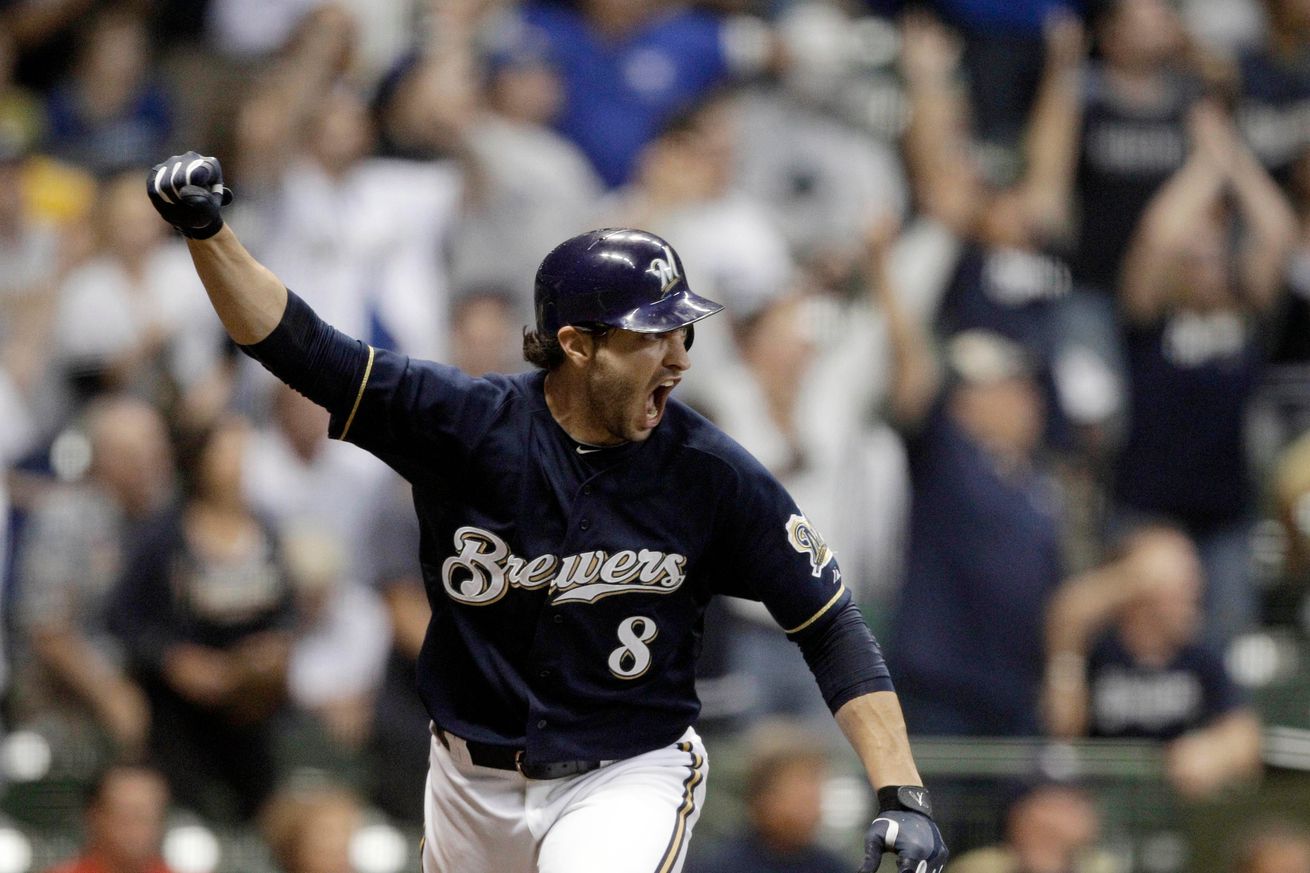
An MVP season from a Brewer legend
Our Brewers All-Time Team series continues today with one of the franchise’s MVP seasons. The rules, again:
- We’re looking for the best individual season at each position, not the best career
- Players can only be used once
- A player must have played more games at the given position in the given season than any other position
We’ve covered the whole infield: catcher, first base, second base, third base, and shortstop. Let’s get to the outfield!
Left Field: Ryan Braun, 2011
150g, .332/.397/.597, 166 OPS+, 38 2B, 33 HR, 111 RBI, 33 SB, 7.7 bWAR, 7.1 fWAR
Two players in the last 15 years won an MVP while playing left field for the Brewers. That could have made this a very difficult choice, but there was a way we could finagle things a bit to get both Braun and Christian Yelich involved, so you’ll just have to wait and see how things shake out. Sorry if that’s a mild spoiler, but I read the comments: most of you already figured it out.
Braun was never not able to hit as a major leaguer. There were things he couldn’t do—play third base, for example—but from the day he arrived in the big leagues (as a very bad third baseman), Braun could hit. He led the National League in slugging as a rookie and won Silver Sluggers in each of the next five seasons. Through his first six years, Braun had a Rookie of the Year award and three top-three MVP finishes.
2011 was the peak of all of that. The Brewers were good—that team set the franchise record for wins in a season—and Braun, Prince Fielder, Corey Hart, Rickie Weeks, and Nyjer Morgan (?!) all had near-career-best offensive seasons at the same time. Braun and Fielder finished first and third in MVP voting. It was sort of a glorious time.
The 27-year-old Braun hit a career-high .332 in 2011, and while he was never a player who walked a ton, he also had a career-high .397 OBP. For the second time in his career, Braun led the NL in slugging, and he tacked on a league-leading .994 OPS as well. He had more speed at that point than at any other in his career, which translated to six triples and 33 stolen bases (also a career-high) at an 85% rate. He earned 7.7 WAR via Baseball Reference, his best season.
When MVP voting came around, it was clear that either Braun or the Dodgers’ Matt Kemp would win. Kemp had more runs scored, homers, and RBIs than Braun and had a slight edge in OPS+ and WAR, but the Dodgers were just 82-79 and missed the playoffs, while the Brewers finished with the second-best record in the National League. The higher finish was enough for voters; Braun received 20 of 32 first-place votes, while Kemp got 10, Fielder got one, and Arizona’s Justin Upton got one.
Braun was an absolute stud in the 2011 playoffs, too: he went 9-for-18 with a homer in the Brewers’ 3-2 series victory over Arizona, and then 8-for-24 with a homer and six RBIs in their 4-2 loss to St. Louis in the NLCS.
Of course… it was later revealed that Braun was on performance-enhancing drugs during at least some of the 2011 season, so some of the shine of his MVP has come off for some fans. For most, though, 2011 was a magical season, even if it ended painfully at the hands of an old, hated foe.
I hinted at this earlier, but the other great left-field season in Brewers history is Yelich’s MVP campaign in 2018, a season in which he split time between left and right field but played more often in left. I’m going to go into this season more when we get to right field, so sit tight, but for right now I’ll say this: Yelich and Braun’s MVP seasons were very closely comparable, but I think I would—by the slimmest of margins—take Braun’s.
Also considered: Braun’s 2012, which was just a little worse than his 2011, but in which he led the NL in homers (41) and runs scored; Ben Oglivie’s 1980, when he hit .304 and led the AL with 41 homers; Greg Vaughn’s 1993, his best full offensive season as a Brewer (30 homers) in which he also played surprisingly solid defense, when he wasn’t DHing; Larry Hisle’s 1978, when the major free agent pickup hit .290/.374/.533 with 34 homers and was the best hitter on the franchise’s first winning team; and Geoff Jenkins’ 2000, when he hit 34 homers and 36 doubles with good defense.
